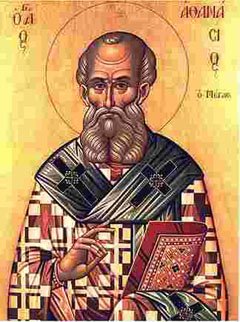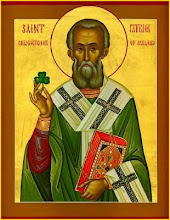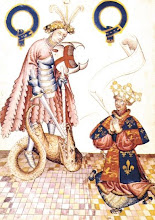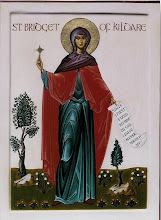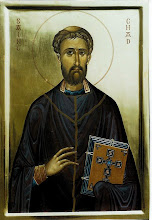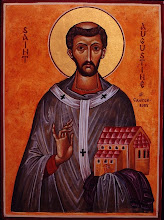1. Romans is the Gospel According to Paul.
Granted, it doesn't look like Matthew, Mark, Luke, or John, in the way their Gospels told the story of Jesus' earthly ministry and interspersed it with His teachings. Paul does it in his own way.
Why is that important to know? Ah, we have the answer to that!
Right now, there are people promoting their religion in your neighborhood who want to give a new interpretation to Holy Scripture. One such group tells of an angel appearing to their founder with golden tablets on which had been written an ancient story. The angel provided special glasses for the man to look through and decipher the writings. The result was their new book, their new doctrine, and their new twist on the message of Christ.
Now, in Galatians chapter 1, we find this from the Apostle Paul: "Even though we OR AN ANGEL FROM HEAVEN preach any other gospel to you that what we preached, let him be accursed."
And then, as though underscoring what he had just said, Paul repeated it. (Gal. 1:8-9)
The point of that is this: we hold in our hands the very message Paul preached up and down the Roman Empire. It's called "The Epistle to the Romans." And Paul says anyone preaching anything other than that is declaring a lie and headed for judgment. Slice it any way you please and it comes up that way!
That's why it's crucial we help our people to get an understanding of Romans.
Someone asked the bank teller, "How do they teach you to recognize all the counterfeit money people try to slip past you?" She answered, "They don't. They just teach us to recognize the real thing. Once we know that, it's a simple matter to catch the fakes."
In teaching Romans, we are helping our people to know and recognize the real gospel of Jesus Christ. There could be no better preparation for dealing with the shams and fakes combing the streets of your neighborhood looking for the naive and unsuspecting.
2. Romans is deep.
Ah, but you knew that. You've started reading it, determining to enjoy it and learn from it, to grow deeper in Christ. Pretty soon, you're deep all right--in over your head, and you're not out of the first chapter! Welcome to the writings of Paul.
Romans is left-brain material. All logic and reason and well-thought out arguments based on revelations of God in the Old Testament as enlightened by the Holy Spirit. There's not a single funny story in the entire epistle! No jokes, no illustrations to speak of, and not a single cartoon if you can believe that--nothing but solid reasoning. Pure truth. It's vintage Paul all the way through.
You may remember what the Apostle Peter said about Paul's writings. Assuming Peter to be the author of the Second Epistle that goes by his name--the scholars are not in agreement over that; although it is most definitely God's Word to us--down toward the end of chapter three, we read:
"...just as also our beloved brother Paul, according to the wisdom given him, wrote to you, as also in all his letters, speaking in them of these things, in which are some things hard to understand, which the untaught and unstable distort, as they do also the rest of the Scriptures, to their own destruction." (II Peter 3:15-16)
We notice three things in Peter's one-sentence commentary on Paul's writings.
(1) There are some things hard to understand. We knew that; we're just glad someone else admits it!
(2) People without adequate understanding misinterpret Paul's writings and get in big trouble. If you question this, tune in any of the hundreds of radio or television preachers and stand amazed at what you hear.
(3) Paul's writings are scripture. Granted, the word "scripture" simply means "writings," but early on, the word was used by believers to refer to Holy Scripture. Biblical historians tell us the early church elevated these writings to Scripture status quickly.
Although "Romans" is deep, it's not all over your head. Much of it is accessible to new believers and those without a biblical background. You don't have to know Greek or have a seminary degree to appreciate chapter 8 of Romans, one of the most sublime chapters in any writings of any time. Scattered throughout the rest of the epistle are gems which the Holy Spirit distributed to encourage us to come on in, open your mind and heart, for what's ahead is well worth the effort.
--Dr. Joe McKeever
Dr. Joe McKeever is a Preacher, Cartoonist, and the Director of Missions for the Baptist Association of Greater New Orleans.
http://www.joemckeever.com/mt/
And hopefully more to come.
Jerry
<><
St. Michael the Archangel
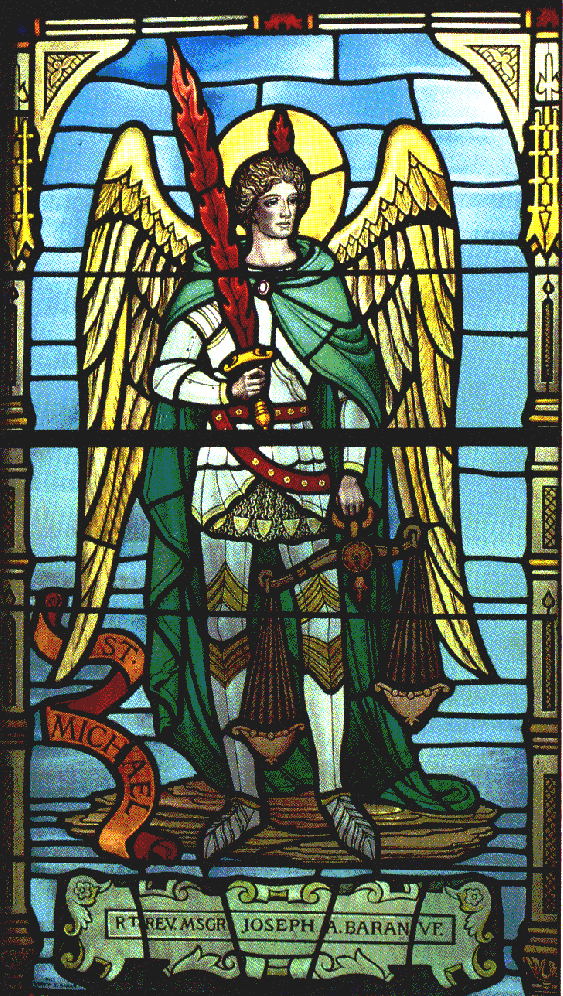
Patron Saint of Police Officers
Friday, November 30, 2007
Ten Things to Know About Romans
Posted by
Jerry S
at
10:10 AM
0
comments
![]()
Thursday, November 15, 2007
Field of Dreams...
I was speaking to a friend on the eve of All Hallows, and we were discussing the state of Anglican orthodoxy in our town. Unfortunately, there is absolutely no truly conservative, non-ECUSA, Anglican presence in our town. In fact, the closest parish is a REC parish located approximately forty minutes away. I find myself of two minds on the matter of this REC parish.
I have spoken privately with the rector and listened to a couple of his sermons; and I find him much to my liking. They are a small but growing congregation with active children’s and youth programs. The rector leads a “prayer walk” through the neighborhood every Sunday afternoon. I see many good things in this parish’s future. Conversely, while some in the congregation have been quite gracious, I have encountered some who would be considered less than welcoming. Another point against is the fact that my wife is less than thrilled with the situation.
I have spent much time in prayer and contemplation on prospects for my family’s place of worship and learning; and the more I think on the subject, the more the thought comes back to me that what we, my family and another, are meant to do is plant a mission. This would, despite the obvious logistical obstacles, solve several problems, only one of which would be a lack of conservative, non-ECUSA Anglicanism.
One huge problem with this idea is the lack of potential parishioners. Our area is served by one Episcopal parish and one mission, of which most of the average Sunday communicants are unlikely to leave their comfortable pews.
Which brings us to the title of this post…a Field of Dreams. Yes, that’s right…the movie, or at least one specific line from it. “If you build it, they will come.” If it is truly meant to be, if it is God’s will, the presence of a new Anglican mission should bring disgruntled Anglicans out of the woodwork. We cannot be the only nine people in this town who are dissatisfied with the state of ECUSA. If we give them an alternative where the true Gospel is taught, won’t they come running? Won’t they come?
Am I completely convinced that this is the way to go? No, this is probably the second most difficult decision I’ve ever faced (the first is one for a later post). One thing of which I am absolutely certain in this question is that it would be easier said than done. I don’t know the first thing about building a mission, being a “founding father” as someone once said. Another is that, if it is His will, God will do all the work…all we have to do is let Him.
Pax
Jerry
Posted by
Jerry S
at
9:37 PM
5
comments
![]()
Friday, November 9, 2007
Thanks, Grandma O
I received the following poem in an email today and thought I would share it. Let me know what you think.
Peace,
Jerry
YOU ASK WHY I FOLLOW THIS JESUS?
You ask why I follow this Jesus?
Why I love Him the way I do?
When the world's turned away from His teachings
And the people who serve Him are few.
It's not the rewards I'm after
Or gifts that I hope to receive
It's the Presence that calls for commitment
It's the Spirit I trust and believe.
The Lord doesn't shelter His faithful
Or spare them all suffering and pain,
Like everyone else I have burdens,
And walk through my share of rain.
Yet He gives me a plan and a purpose,
And that joy only Christians have known,
I never know what comes tomorrow,
But I do know I'm never alone.
It's the love always there when you need it;
It's the words that redeem and inspire,
It's the longing to ever be with Him
That burns in my heart like a fire.
So you ask why I love my Lord Jesus?
Well, friend, that's so easy to see,
But the one thing that fills me with wonder is
Why Jesus loves someone like me.
-- Author Unknown
Posted by
Jerry S
at
5:34 AM
0
comments
![]()
Thursday, November 8, 2007
Thanksgiving
4 I thank my God always on your behalf, for the grace of God which is given you by Jesus Christ. [I Corinthians 1.4]
Every year, on the fourth Thursday in November, we Americans celebrate, as a nation, a day of Thanksgiving. My question is this: Why do we, a people who largely confess affection for God, need a governmentally mandated day on which we are to give thanks? The Holy Scriptures are chock full of references to thanksgiving. Are we in a better state than David? Or the Apostles? Or even our Lord Christ Jesus, Himself? If it is true that God rules over all things and provides all things, then it stands to reason that we should give thanks to Him for all that we have. Consider this also: if God rules over all things and provides all things, and if it is also true that God uses all things to the good for those who love Him, then we should further praise and thank him for those things that we perceive as bad, since He will doubtless ensure a good outcome. We should, for lack of better expression, thank God for those things that we do not have, as it is for His glory that we have or have not.
10 Wherefore David blessed the Lord before all the congregation: and David said, Blessed be thou, Lord God of Israel our father, for ever and ever. 11 Thine, O Lord, is the greatness, and the power, and the glory, and the victory, and the majesty: for all that is in the heaven and in the earth is thine; thine is the kingdom, O Lord, and thou art exalted as head above all. 12 Both riches and honour come of thee, and thou reignest over all; and in thine hand is power and might; and in thine hand it is to make great, and to give strength unto all. 13 Now therefore, our God, we thank thee, and praise thy glorious name. 14 But who am I, and what is my people, that we should be able to offer so willingly after this sort? For all things come of thee, and of thine own have we given thee. [I Chronicles 29.10-14]
These questions are even more challenging when we consider them in the context of David’s prayer of thanksgiving from I Chronicles 29:10-14. David recognizes that all things come from God the Father Almighty and by extension recognizes his obligation to give thanks for all, taking his logic to its most rational conclusion. The text, in verse 14, shows David’s realization that, since all things come from God, then even the ability to give thanks is a gift of God.
Why would God give us a gift, which He does not expect us to use? The short, and most obvious answer is: He wouldn’t.
And please do not think from this post that I consider myself above my own criticism. Quite to the contrary, I most wholeheartedly include myself. I know that I do not thank and praise God nearly enough. Try with me to remember God's goodness all year round, not just every fourth Thursday in November.
Let us give thanks unto our Lord God, for it is meet and right so to do. Amen.
Posted by
Jerry S
at
8:41 AM
3
comments
![]()
Saturday, November 3, 2007
Confusion
Confusion can be a wonderful thing, should one choose to use it properly. It can provide for us motivation to explore and learn, which is surely the purpose God has in mind for it. Confusion is His way of telling us that we don't know as much as we think. We don't have it all together. If we recognize this, and look in the right direction (meaning toward God), we can come to greater truths than we ever thought possible; we can come to a greater knowledge of our Lord.
Confusion has its down side, too. More often than not, confusion becomes an excuse to leave something alone. We think to ourselves, "I'm confused and I don't know where to turn. Forget it; I'm done with this religion stuff." There is also the likelihood of confusion leading us astray. There are so many different resources available to the searcher, some good and others not so good, that many take the wrong paths.
There is a term used in the courts, which applies to the question of confusion: "the totality of circumstances." One must consider the totality of the circumstances, the sum of the facts, when deciding the question of truth. The amazing thing about our faith is its historicity. Not the denominational question, as there are good points and bad in all the true Christian denominations, but the matter of our orthodoxy - our beliefs. There is a risen Christ, and He was seen in this world by hundreds of eyewitnesses. We can look into historical texts, as well as religious, to aid us in our quest for the truth.
Now, before I confuse myself, I'll stop rambling for now.
Pax et bonum
Posted by
Jerry S
at
1:21 PM
0
comments
![]()
